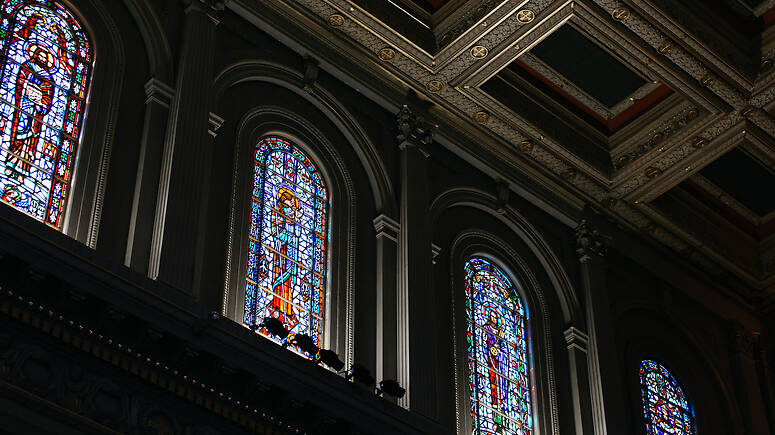
Pierless Bridges
The Joan and Ralph Lane Center for Catholic Social Thought and the Ignatian Tradition
Bridging Church, Society, and the Academy


In Laudato si’, Pope Francis writes not only to the Catholic faithful or people of goodwill but to “every person living on this planet1” about caring for our common home. The universal audience is not presented as a monolithic body. He does not view humans as empty vessels into which this teaching is poured. He sees all creation in its singularity and its collectivity. The Pope invites a dialogue across different contexts, harnessing the wisdom of diverse perspectives, religious and secular, all united by a common concern to address the environmental crisis.
Generating an authentic and inclusive dialogue with Catholic social teaching lies at the heart of the Lane Center’s mission. Authentic dialogue involves listening, translating, and bridging multiple “publics,” to use the language of theologian David Tracy. Writing on the task of the theologian, Tracy names three publics to which theology must speak — the church, academy, and society. Each public is recognized by a set of questions relevant to them. A good theologian does not simply answer questions but makes critical correlations that together transform the message and the audience.2 Fostering a mutually transformative dialogue on Catholic social thought among church, society, and academy presents challenges and opportunities that frame and energize the work of the Lane Center.
Engaging the Church
The 1971 Synod of Bishops recognized the need for the Church to manifest the justice it proclaims in order to speak with credibility to the modern world: “While the Church is bound to give witness to justice, she recognizes that anyone who ventures to speak to people about justice must first be just in their eyes.”3 The Lane Center promotes justice in the Church by offering a context where scholars can generate contextual, critical theologies that reflect the diversity of Catholicism. Kerry Robinson, whose 2019 lecture on “Women Shaping the Catholic Social Tradition” is featured in this volume, illustrates why diverse voices are essential for promoting justice in the church. She asks, “Who is at the tables of decision-making matters.... We only know what we know. We need the diversity of perspectives and experiences to be healthy and whole and wiser and more prudent.”4
Engaging Society
Fr. Arturo Sosa, Superior General of the Society of Jesus, emphasized the transformative role of Jesuit universities in society when he declared before a worldwide gathering of academics: “When the university is conceived as project of social transformation, it moves towards the margins of human history, where it finds those who are discarded by the dominant structures and powers.”5 Walking with the marginalized is one of the Universal Apostolic Preferences (UAPs)6 guiding the work of the Jesuits and partners in mission for the next 10 years. One of the ways we can respond to this invitation as a university is through socially engaged research. With partners in Jesuit social ministries and higher education, the Lane Center has convened two social research summits, exploring the many ways in which the Ignatian tradition informs how we do research — how we think of our vocation as scholars, how we formulate research questions, and how we engage others on our campuses and in our communities.
Social research that combines analysis and reflective action has a rich history in the Ignatian Tradition and remains a key dimension of how the university fulfills its vocation to transform society.
Among the countless possibilities for social engagement, our priorities are shaped by both our San Francisco location and the concerns that emerge from our shared mission with other Jesuit projects, regionally and globally. In the next 10 years, we will promote research around two UAPs – walking with the marginalized and caring for our common home.
Engaging The Academy
Catholic social thought, generated by the dynamic process of reading the signs of the times, depends on collaboration across academic disciplines. Pope Francis makes this clear in Laudato si’. Because everything is connected, the climate crisis requires analysis across sciences, humanities, and other disciplines, all in dialogue with wisdom found beyond the academy. Yet as James Keenan, SJ, and others have pointed out, the academy presents barriers to collaboration across disciplines and beyond the walls of the university.7 This reality makes the “bridging” work of the Lane Center so important. Our 2019 social justice roundtable brought together faculty in religious studies, philosophy, international studies and the sciences who served as resources for a critical conversation on environmental justice and the economy. The forthcoming book that emerged from this roundtable highlights a generative engagement with Catholic social thought across disciplines that is united by a commitment to justice, serving as one example of our efforts at the Lane Center to bridge church, society, and the academy.
ERIN BRIGHAM, PhD, is executive director of the Joan and Ralph Lane Center for Catholic Social Thought and the Ignatian Tradition at the University of San Francisco, where she also serves as chief mission officer. She teaches Catholic theology and social thought, and her current research focuses on ecclesiology, public theology, and gender in Catholic social thought.
References
- Pope Francis, Laudato si’, Vatican.va, 3.
- David Tracy, Blessed Rage for Order: The New Pluralism in Theology (New York: Seabury [Crossroad], 1975).
- 1971 Synod of Bishops, Second General Assembly, “Justice in the World,” 40.
- Kerry Robinson, “Women and the Church: Bearing Witness to New Life,” Lecture on “Women Shaping the Catholic Social Tradition” (University of San Francisco, November 15, 2019). U.S. citizen. As a group, we had no difficulty crossing the border into Mexico. No one stopped us or questioned us. With the same ease, we returned to the U.S., walking and bypassing immigration agents by simply flashing our U.S. passports and answering a couple of questions.
- Arturo Sosa, SJ, “The University As a Source of a Reconciled Life,” Address to the World Meeting of Universities Entrusted to the Society of Jesus (Loyola, July 10, 2018).
- Society of Jesus, “Universal Apostolic Preferences” available at https://jesuits.global/en/about-us/universal-apostolic-preferences.
- James Keenan, SJ, University Ethics: How Colleges Can Build and Benefit from a Culture of Ethics (Lanham, MD: Rowman & Littlefield, 2015).
